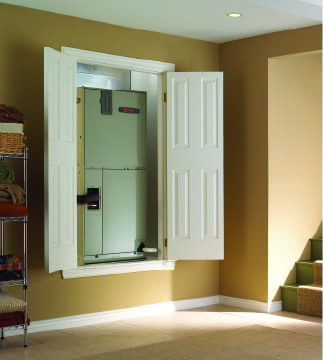We all rely on several high-ticket machines to help keep our lives functional, safe, and happy. However, when those machines break down, the question becomes where in its service life it falls and whether fixing it is warranted. Is it worth the cost of repairs, or should you cut your losses and replace the equipment? Consider these nine signs that the cost of repairs might not be justified, and you may want to consider a new system.
1. It’s Nearing the End of Its Intended Service Life
HVAC systems have a defined service life, after which they lose some of their effectiveness and efficiency. For a gas furnace, that service life is generally 15 to 20 years when properly maintained. Air conditioners and heat pumps are a little shorter, usually between 10 and 15 years, again when properly maintained.
The industry recommendation is that when your system reaches the 10-year mark, you should start weighing these other variables. These, combined with age, may mean it’s time to consider a new system.
2. Your System Is No Longer Safe
Safety with HVAC operation is something that’s commonly taken for granted but is a major factor for anyone involved with servicing the systems. Both furnaces and air conditioners have safety concerns that, if neglected, can cause serious harm to you or your home.
For the furnace, the most important safety consideration is the heat exchanger, which is part of the exhaust system and also transfers the heat to the circulating air. Since it directs the exhaust from the burnt gas, cracks in the exchanger can allow that toxic mix into your home. This is one of the leading causes of carbon monoxide exposure in residential buildings.
For air conditioners, there are two safety considerations. On the minor side is a leak in the refrigerant system inside your home. Unlike furnaces, there is only so much refrigerant in the system, so there is limited exposure.
The more serious consideration for your AC is electrical. Perhaps the system has some sort of short, or it’s drawing too much power. The overdraw can happen when your compressor is working too hard, causing your circuit breaker to trip. If the breaker is working properly, the risk is limited. That is unless you try to do something to circumvent the breaker, which then poses a risk of overloading the system and causing an electrical fire.
A cracked heat exchanger or a burned-out AC compressor commonly means that it’s time to replace your system. You may want to consider repairing these when they are still covered by the manufacturer’s warranty.
3. Your Heating and Cooling Bills Are Climbing
Keeping an eye on your heating and cooling bills is always a good idea for managing your budget. However, it’s also a good way to keep an eye on how your heating and cooling system is functioning.
Rather than watching merely the amount of your bill, which is subject to change with the fluctuations in the cost of energy, watch your consumption. An unexplained increase in electricity or fuel consumption can signal that your system is running less efficiently. It’s common knowledge among HVAC technicians that systems nearing the end of their service life experience a decrease in operating efficiency.
4. Heating or Cooling Has Become Less Effective
A system that’s working properly will heat and cool your home evenly and will maintain the temperature you set on your thermostat. However, an aging system may struggle to do either of these tasks.
This happens because the components in older systems stop working as effectively. For instance, the circulating fan may not spin as quickly, producing less air circulation. In turn, this causes some areas of your home to receive less conditioned air than others, leaving cold and hot areas. Some of the parts may fail prematurely and require repair, so age is an important consideration in determining whether the repair is worth the cost or not.
5. You’re Needing More Frequent Repairs
In addition to running less efficiently, aging HVAC units commonly need to be repaired more often. You’ll experience the peak of repairs over the last two years of its service life. If you find that you’re needing frequent repairs for your furnace, heat pump, or air conditioning, it may be time to upgrade. A technician can evaluate the frequency of your repairs and identify if they’re related to an aging system or if there’s a different underlying cause that even a new system may not correct.
6. The Cost of Repairs Is High
The cost of repairs is an important consideration when evaluating whether to repair your system or replace it. Some recommend that you should replace your unit if the cost of a repair equals more than half the cost of a replacement. This may be a good rule of thumb, but it overlooks the important consideration of age and frequency of repairs.
A more accurate measure is looking at the cost of repairs needed along with all repairs completed in the previous two years. Multiply that cost by the age of your unit. If the product is greater than the cost of a new system, you may save money by replacing your unit now.
7. You’re Selling Your Home in the Near Future
Next, consider how quickly you want to sell your home. If you are planning to list it in the next few years, it may be advantageous to replace your system now rather than repair it. While it may not add directly to the value of your home, it will make the property more attractive to potential buyers.
One major consideration buyers evaluate is the major repairs the home will need in the next couple of years, including the home’s heating and cooling system. By replacing your unit rather than repairing it, you get ahead of this and remove an aging system as a hindrance to quality offers.
8. You Want to Take Advantage of Tax Breaks
If your system is older than 10 years and requires repair, evaluate the various tax credits and rebates you may have available. There are often some tax benefits for installing a high-efficiency system. Be sure to consult your tax professional to explore what’s currently available and how much it may benefit your tax liability.
9. You Anticipate Major Life Changes
The other consideration is whether you expect major life changes in the near future. These may be anything from having children to retiring. If your system is nearing the end of its expected service life and you’re expecting one of these changes, get ahead of future headaches. Avoid getting into these life changes and then having the problems and expense of replacing your heating system or air conditioner.
Comfort is what we have reliably delivered to all of our clients around North Charleston since 2009. Our Charleston Heating and Air team provides heating and AC installation, maintenance, and repair along with a host of plumbing and electrical services. Call to schedule your HVAC repair or new system consultation with one of our trusted and friendly technicians.

